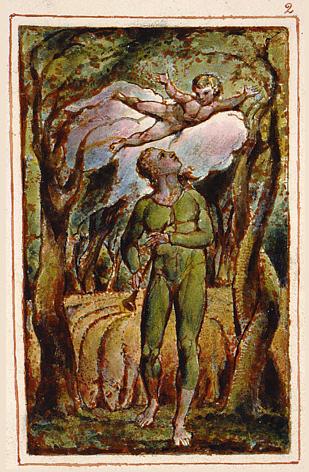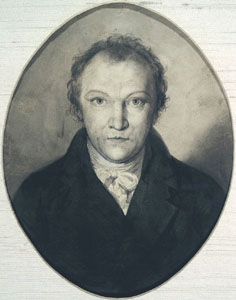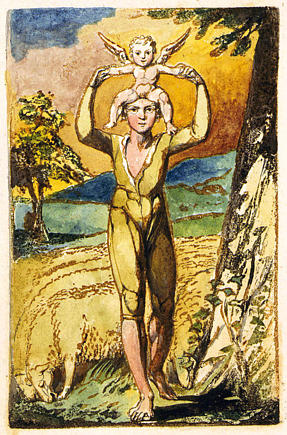
Copy AA


Copy C
for ENG 234

Copy AA |
 |

Copy C |
IntroductionBlake first published Songs of Innocence in 1789, a collection of 23 short poems that he not only wrote but also illustrated himself. Although ostensibly a collection of poems for children, Blake's Songs raise challenging theological, philosophical, social, and political questions, and from the beginning they were read by adults as well as children. Over the next few years, Blake also composed Songs of Experience, a companion volume to Innocence containing another 21 poems (or so), and beginning in 1794, he most often published the two collections together in a single volume, as Songs of Innocence and of Experience: Showing the Two Contrary States of the Human Soul. There are a few important things you should know before reading these poems. First of all, every copy of these poems was originally printed and illustrated by hand, and Blake took advantage of this opportunity to make every copy unique, reordering the sequence of the poems nearly every time, moving some poems back and forth between the Innocence and Experience sections, making changes to the printed text and illustrations by hand, and coloring each printing differently, and often radically differently, in every single copy. This means that there is no single definitive edition of the Songs, and thus each of the few dozen surviving copies of Innocence and Experience presents a unique reading experience and carries unique meanings. Secondly, we should acknowledge that, unlike most canonical poetry, Blake's poems employ their illustrations as a vital component of their meaning, not merely as decoration, and so it is important that the poems be read in conjunction with their "illuminations" to understand them adequately. I've included an illuminated version with each poem below that I've borrowed from the incredible William Blake Archive, so that you can see how the text of the poems interacts with their illustrations. I've also created a second page here that selects illuminated pages from alternate copies of the Songs so that you can see how these poems vary from copy to copy. Thirdly, many — though by no means all — of the poems in Experience are written as "companion pieces" to poems in Innocence, and to facilitate comparison between these companion pieces, I have decided to lay them out below in two columns so that they might be read side by side. This, by the way, is entirely my editorial choice, and not Blake's: he groups all of the Innocence poems first and then all of the Experience poems second. In any case, you can choose to read all of the Innocence poems (on the left) first and the Experience poems (on the right) second, or else you can alternate between them if you prefer. But do make sure that you give some thought to: a) how the Innocence poems are related to one another; b) how the Experience poems are related to one another; and c) how the Innocence poems are related to the Experience poems, since this relationship of Innocence and Experience is what we're going to focus on in class. Lastly, I decided to modernize and regularize Blake's spelling and punctuation in my transcriptions to make it easier for you to get at his meaning. Normally I'd object to this sort of thing, since the ambiguities and the difficulties of Blake's language are an important feature of these poems, but since we're only taking a brief look at Blake, I made it a priority to make this material as accessible as possible for you. Above all: enjoy! -- Rob |
|
Copy C |
Copy C |
Copy AA |
Copy F "Introduction" [to Innocence] Piping down the valleys wild, "Pipe a song about a Lamb!" "Drop thy pipe, thy happy pipe; "Piper sit thee down and write And I made a rural pen, |
Copy L "Introduction" [to Experience] Hear the voice of the Bard! Calling the lapsed Soul O Earth, O Earth, return! Turn away no more: |
Copy Z "The Lamb" Little Lamb, who made thee? Little Lamb, I'll tell thee; |
Copy L "The Tyger" Tyger Tyger, burning bright, In what distant deeps or skies And what shoulder, and what art, What the hammer? what the chain? When the stars threw down their spears Tyger Tyger, burning bright, |
Copy Z "The Echoing Green" The Sun does arise Old John with white hair Till the little ones, weary, |
Copy AA "The Garden of Love" I went to the Garden of Love And the gates of this Chapel were shut, And I saw it was filled with graves, |
Copy Z "The Chimney Sweeper" [from Innocence] When my mother died, I was very young, There's little Tom Dacre, who cried when his head And so he was quiet, and that very night And by came an Angel, who had a bright key, Then naked and white, all their bags left behind, And so Tom awoke and we rose in the dark |
Copy Z "The Chimney Sweeper" [from Experience] A little black thing among the snow, "Because I was happy upon the heath, "And because I am happy, and dance and sing, |